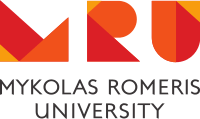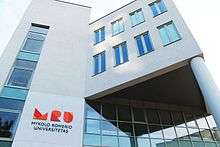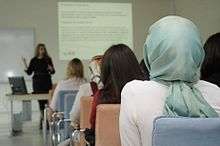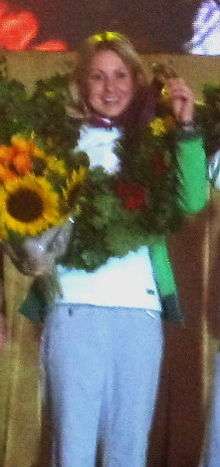Mykolas Romeris University
Mykolas Romeris University (Lithuanian: Mykolo Romerio universitetas) is one of Lithuania's largest universities, bearing the name of the Lithuanian legal scholar, judge and father of Lithuania's Constitutional Law Mykolas Römeris. Established after restoration of independence of the Republic of Lithuania in 1990, it became a state university.
Mykolo Romerio universitetas | |
 | |
Former names | The Law University of Lithuania |
|---|---|
| Type | Public university |
| Established | 1991 |
| Rector | Prof. Dr. Inga Žalėnienė |
Academic staff | 736 |
Administrative staff | 385 |
| Students | 6,500 |
| Location | , 54°44′02″N 25°15′32″E |
| Colours | yellow, orange, red |
| Website | www.mruni.eu |
Currently MRU enrolls approximately 6,500 students from 58 countries. University Faculties are located in two cities: Vilnius and Kaunas. For International Students University offers Bachelor, Master and Doctoral study programmes in English language in the field of Social Sciences.
The University is active in various world university organizations including the European Universities Association (EUA) and the International Association of Universities (IAU). MRU has forged international partnerships with over 300 universities, public and private institutions abroad. The MRU Asian Centre, Francophone Studies Centre and King Sejong Institute are also known for their organized events, conferences and numerous lectures. International relations are further enhanced by visits and lectures by researchers, Embassy officials and well known university organization representatives.
Mykolas Romeris University is successfully implementing one of its most important missions – to foster a culture of research and innovation. In 2015 there were almost 900 research papers published and more than 50 academic events organized. There are 6 doctoral studies programmes at the University. Open access to research results is implemented.
In 2015 the new Mykolas Romeris University affiliate, the Social Innovations Laboratory Centre - MRU LAB with 19 laboratories, was opened on campus. The Laboratories seek to apply the latest research results to the needs of society at large. The Research and Innovations Aide Centre has been established at the new Lab building as well.
History
- October 28, 2004, the Seimas of the Republic of Lithuania approved a resolution (No. IX-2515) "Changing the Name of the Law University of Lithuania and Approval of the Statute of Mykolas Romeris University.
- December 16, 2004, the Senate of Mykolas Romeris University unanimously approved Professor Alvydas Pumputis as Rector (Resolution No. 1SN-9).
- July 23, 2009, the Seimas of the Republic of Lithuania by Resolution No. XI-411 approved the new Statute of Mykolas Romeris University.
- According to the July 23, 2009 Resolution Nr. XI-411 of the Seimas of the Republic of Lithuania, which approved the Statute of Mykolas Romeris University and the Resolution of Mykolas Romeris University's Senate of October 6, 2009, (No. 1SN-10), the state higher education and studies budgetary institution Mykolas Romeris University was reorganized into the state higher education public institution Mykolas Romeris University.
- April 29, 2015, Mykolas Romeris University's (MRU) new Rector Assoc. Prof. Algirdas Monkevičius was inducted in a ceremony on campus. From January 15, 2019 Assoc. Prof. Algirdas Monkevičius was appointed for the Minister of Education, Science and Sport.
- March 14, 2019, Mykolas Romeris University's (MRU) Council voted to approve MRU Law School's Private Law Institute Prof. Dr. Inga Žalėnienė as the University's new Rector. Žalėnienė was appointed to a 5-year term.
Structure
The founder of the university is Seimas of the Republic of Lithuania.
The management bodies of the university are University Council, the University Senate and the University Rector.[1]
Mykolas Romeris University consists of: 2 faculties and 4 Institutes, Mykolas Romeris Law School and Public Security Academy. It offers more than 90 programmes at the Bachelor's, Master's, and Doctoral levels in Lithuanian and English languages. Studies are carried out in compliance to the major principles of Bologna process. The major fields of study are Business, Communication, Economics, Educology, Finance, History, Management, Informatics, Law, Management, Philology, Philosophy, Political Sciences, Psychology, Public Administration, Public Security, Social Work, and Sociology.

Faculties

- Faculty of Economics and Business
- Faculty of Public Governance
Institutes
- Institute of Communication
- Institute of Educational Sciences and Social Work
- Institute of Humanities
- Institute of Psychology
Other Departments
- Public Security Academy (in Kaunas)
- Mykolas Romeris Law School
Administration units

- Academic Affairs Centre
- Career Centre
- Digital Studies Unit
- Qualification Improvement and Recognition of Competencies Department
- Library
- Research and Innovation Support Centre
- Research Quality and Analysis Office
- Social Innovations Doctoral School
- Research Communication Division
- Knowledge and Technologies Transfer Office
- Projects Office
- International Office
- Asian Centre
Asian Centre MRU was established in April 2013 and it focuses on cooperation with Japan, South Korea, China and India. It also offers Korean, Chinese and Japanese language courses free of charge.
- King Sejong Institute
Vilnius King Sejong Institute (KSI) at MRU promotes cultural understanding Lithuania - S. Korea through Korean language, culture, economics and politics courses. KSI teaches Korean language and culture to foreigners who want to learn Korean as a second language or a foreign language.
- Francophone Studies Centre
- Chancellery Office
- Document Office
- Legal Office
- Personnel Office
- Artistic Education Centre
- Property Management Office
- Building Management and Maintenance Division
- Service Unit
- IT Centre
- Health and Sports Centre[2]
Studies


For International Students Mykolas Romeris University offers 9 Bachelor, 18 Master and 6 Doctoral degree programmes in English language.[3]
- It is the first University in Lithuania, which offers the possibility to choose international joint study programmes leading to double or even triple diplomas. Joint programmes are offered in cooperation with Universities from UK, France, Austria, Finland, Latvia and South Korea.
- About 500 University students each year participate in international exchange (studies and traineeships) via Erasmus, Nordplus or other international programmes.
- At the present students taking our programmes come from over 58 countries such diverse as USA, Jamaica, Germany, Ukraine, Turkey, Azerbaijan, India, South Korea and so on.
- Study programmes offered at Mykolas Romeris University are continuously renewed and updated, responding to the need of society and providing young people with knowledge and skills necessary to build a successful career.
- A Lithuanian degree diploma is recognized in all the countries which have signed the Lisbon Recognition Convention – signed by 50 countries and international organizations. That means students can be sure that their qualifications gained in Lithuania will be valid in all these countries.
- In 2010 Mykolas Romeris University was awarded with the Diploma Supplement Label which indicates that the Diploma Supplement of MRU meets the European Commission's, the Council of Europe's and UNESCO/CEPER' created sample.
- In 2012 Mykolas Romeris University was awarded with ECTS Label. The label raises the profile of the institution a transparent and reliable partner in European and international cooperation (awarded only to 64 institutions in Europe, only 2 in Lithuania). It is one of the most important signs attesting to a high quality of studies at the University.
- In 2019 Mykolas Romeris University was the only Lithuanian university that appeared in the QS World University Rankings by Subject 2019, ranking for law among the 300 best universities of the world, taking the 251-300 position.
Undergraduate programmes
- International and Intercultural Communication
- Leisure and Entertainment Education
- Financial Industry
- Informatics and Digital Contents (joint study programme with Dongseo University, South Korea)
- Tourism Management and a Heritage
- Communication and Digital Marketing
- English for Specific Purposes and the Second Foreign Language
- Psychology
- Social Work and Legal Fundamentals
Graduate programmes
- MBA (Business Administration)
- Financial Markets
- Electronic Business Management
- International Law
- Public Administration
- Informatics and Visual Contents (joint study programme with Dongseo University, South Korea)
- European and International Business Law (joint study programme with University of Savoie, France)
- European Union Law and Governance (double diploma programme with Bordeaux University, France)
- Social Work with Youth and Children (joint study programme with Riga Stradins University, Latvia)
- Legal Regulation of Public Administration and Human Rights (joint study programme with Taras Shevchenko National University of Kyiv, Ukraine)
- European joint master's in Strategic Border Management (joint study with NL, LV, ES)
- Private Law (joint study programme with Taras Shevchenko National University of Kyiv, Ukraine)
- Intellectual Property Law (joint study programme with Taras Shevchenko National University of Kyiv, Ukraine)
- Comparative Social Policy and Welfare (joint degree with University of Tampere, Finland and Johannes Kepler University Linz, Austria)
- Public Relations Management
- Logistics Management
- Business Psychology
- International Politics and Economics (joint study programme with Dongseo University, South Korea)
Postgraduate programmes
- Law
- Law, Science and Technology - LAST-JD - (programme implemented in cooperation with University of Bologna, Italy, University of Turin, Italy, Autonomous University of Barcelona, Spain, University of Luxembourg, Luxembourg, Tilburg University, The Netherlands)
- Management
- Economics
- Psychology
- Education
Research
Mykolas Romeris University engages in fundamental and applied research, takes part in national, regional and international research programmes and projects, and practically applies research results and disseminates them to the public. The research results, carried out in the University's faculties, departments, in laboratories, institutes, and centres, make up the basis of integration between research and studies. Traditionally the University has engaged in research in the area of social sciences and more recently, has initiated research in biomedicine, technology and the humanities.[4]
Internationalization
International cooperation at MRU is oriented to strengthen internationalization in studies and research. In partnership with other institutions, joint study programmes are created. Students, academics and administrative personnel participate in exchange programmes, international conferences and other events. The University's international ties span all the regions of the globe. It has affiliations with more than 400 foreign academic and state institutions. From 2006, the University offers joint master's degree study programmes and encourages its students to attain double or triple diplomas. One of the goals of University's internationalization is student diversification, thus the number of international students is continually growing. This enables both Lithuanian and international students to share experiences and ideas as well as to work together on joint international projects, expanding their world views and cultural awareness.[5]
Currently MRU has over 500 of international students with majority of students coming from Ukraine, Turkey, France, Germany, Italy, Spain. Every semester number of International degree seeking students and exchange students (under Erasmus+ and bilateral agreements) is growing.
Campus
The University is known for having modern – and some of the best – infrastructure in the country MRU's Central Campus is located in the Northern part of Vilnius, surrounded by the park:
- The Campus is easy accessible by public transport from any place in Vilnius. It takes approximately 25 minutes to reach city center by bus.
- Accommodation on campus is offered for all international students, a place in a triple or double room at the University's Students house costs 85-100 euros per month.
- For convenience of students, University offers dining hall and cafeterias where it is possible to have breakfast, lunch or dinner for 2-4 euros.
- University Library and lecture halls are located only 5 minutes' walk from Students House.
- Many additional services offered by the University are completely free of charge - a huge parking lot, sport halls and gyms, outdoor sports equipment, wireless internet, cultural and educational activities, courses of foreign languages, etc.
Sports

Mykolas Romeris University is a perfect place to train or work out. Students are encouraged to engage in an active lifestyle on campus through organized activities and individual health promotion. New athletic halls for gymnastics, games and table tennis have been set up.
- MRU was a partner of EuroBasket 2011, holding practices of all the top 8 teams.
- Mykolas Romeris University has been cultivating the Olympic spirit for a long time, and as a proof of that on December 1, 2010, the Lithuanian National Olympic Committee (LNOC) awarded the Rector of Mykolas Romeris University, Prof. Dr. Alvydas Pumputis, with LNOC's Honorary Medal for the University's contribution to sports. Artūras Poviliūnas, the President of Lithuanian National Olympic Committee, said that athletes at this University have the best study conditions, which highly contribute to their possibilities for reaching Olympic heights.

Olympic medallists
- 2016 Summer Olympics in Rio de Janeiro: MRU students Mindaugas Griškonis and Saulius Ritter won a silver medal in the Rowing Men's Double Sculls.[6]
- 2012 Summer Olympics in London: MRU alumni Laura Asadauskaitė-Zadneprovskienė won a gold medal in pentathlon, MRU student Jevgenij Šuklin won a silver medal in the Men's Canoe Single's Finals 200 m event.[7]
- 2008 Summer Olympics in Beijing: MRU students Edvinas Krungolcas and Andrejus Zadneprovskis were silver and bronze medal in pentathlon.[8]
- 2004 Summer Olympics in Athens: MRU student Andrejus Zadneprovskis won a silver medal in pentathlon.
Other athletes
- MRU student Giedrius Titenis is a two-time Olympic swimmer, who won a bronze medal in the 2009 World Aquatics Championship.
- MRU student Andrej Olijnik participated in the 2016 Olympics, and won a silver medal in the 2011 ICF Canoe Sprint World Championships.[9]
References
- "The Statute of Mykolas Romeris University" (PDF).
- "Organizational Structure".
- http://www.mruni.eu/en/prospective_students/degree_programmes/
- http://www.mruni.eu/en/research/mokslas/
- http://www.mruni.eu/en/university/naryste/
- MRU Students Griškonis & Ritteris - Won Silver at Rio Olympics!
- Puikūs MRU studentų startai Londono olimpiadoje
- http://www.tv3.lt/naujiena/209734/likus-vienai-rung-iai-e-krungolcas-tre-ias-a-zadneprovskis-sestas-foto/rubrika:naujienos-sportas-pekinas2008
- https://www.mruni.eu/lt/naujienos/detail.php/rio-olimpiniu-zaidyniu-finale-puikus-a-olijniko-ir-r-nekriosiaus-dueto-rezultatas-/230980/148#.V8tXujUYmDk
External links
- (in English) University Website
- (in English) European Commission Joint Research Center